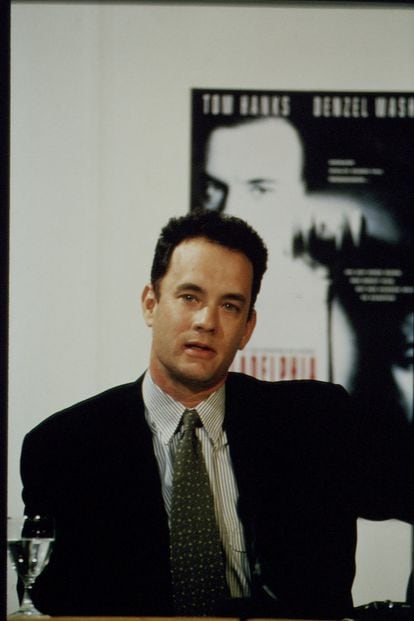At the 2020 Golden Globes gala, Tom Hanks (California, 65 years old) joked with the press about the biggest common place of his career: that he always plays good person roles.
"My current plan is to go to Australia to work with Baz Luhrmann," he announced about casting him for the Elvis Presley biopic.
"I will play Colonel Tom Parker and silence all your stupid questions about why I never do bad."
Two years later, the film is about to be released (it will be June 24 in Spain), Hanks has an important nuance about his character, considered the villain in the shadow of the singer's life: "He's not evil, he's just wrong" , declared in an interview with David Marchese in
The New York Times
which, due to its honesty, is giving a lot to talk about these days on the networks.
It would seem that, even when he turns the image of himself into the role of a manipulator, Tom Hanks ends up highlighting the most human traits of the character, those with which it is possible to identify.
It's what he's been doing for most of his career.
Compared to chameleon actors, he is an old-fashioned star, one of those celebrities where character and performer are indistinguishable.
Those whom the public wants to see in a record maintained over time assuming that the actors were exactly as they appeared on screen.
John Wayne always represented the same kind of old-fashioned masculinity;
Bette Davis was the baddie the public loved to hate;
Cary Grant, the humble seducer who oozed charm;
Katharine Hepburn, the independent woman;
James Stewart, the upstanding next-door neighbor everyone could relate to.
With whom Hanks has been compared the most is precisely with James Stewart.
Both are the common man, the average citizen in his most idealistic and positive version.
The viewer identifies with them, they are what the public would like to be.
In more cynical times this is not so good: that impeccable image is seen with a certain condescension.
Patriotism and the desire to tell stories of a specific time, that of the childhood of the
boomer generation,
as reactionary and conservative.
Being the ideal son-in-law and the perfect father seems less interesting than being an antihero.
But in times of moral crisis, the archetypes of “the good guy” and “the bad guy” have been subverted again.
Bill Cosby, the father of America, turned out to be a monster.
Kevin Spacey, the character actor, a satyr.
Against this, Tom Hanks has a bombproof public image.
There are no complaints about "equivocal behavior" on sets, no disgruntled colleagues who criticize him, no economic or moral scandals.
He has been married to director Rita Wilson since 1988 and there have been no public shadows in his marriage beyond the fact that one of his four children has come out a bit conflicted.
It seems that Hanks is, despite everything, just what he seems: a decent guy,
Tom Hanks in a promotional image taken in 1980 for the ABC series 'Bosom Buddies' (broadcast in Spain under the title 'Amigos del alma'). Walt Disney Television Photo Archives (ABC)
This career full of milestones was built and defined little by little.
He started out as a kid with weaknesses, very much in the style of 1980s cinema.
Today he is a flawless but realistic hero.
We review Tom Hanks' career through some of his most iconic films and his own words.
Bachelor Party
(1984)
With an unusual humility in his profession, in an interview in
Playboy
in 1989 he acknowledged that his first successes would have been just as successful without him.
"I can't take credit for the success of
Splash
and
Bachelor Party
, other than being in the right place at the right time and getting the job."
Big
(1988)
Penny Marshall's film about a 13-year-old boy who suddenly asks to become an adult and succeeds was his first success with critics and audiences, his first Oscar nomination and confirmed him as a box-office star capable of leading ambitious projects (for his role they had shuffled the names of Harrison Ford or Robert De Niro).
On her day, she presented it simply: "It's a genuinely good movie that I think is really honest and touches consciences."
The Bonfire of the Vanities
(1990)
For the film adaptation of Tom Wolfe's novel, they decided to make the character of Hanks into a nice guy.
The result was a fascinating fiasco that podcasts are still devoted to today.
Hanks has no mercy for himself: “It's one of the most horrible movies ever made!” he told Oprah Winfrey.
"Everyone was a casting mistake, especially me."
Tom Hanks at the Berlin Film Festival in 1993 promoting 'Philadelphia', the film with which he won his first Oscar.Ronald Siemoneit (Sygma via Getty Images)
Philadelphia
(1993)
Hanks got his first Oscar for playing a lawyer with AIDS who was fired for it at a time when the disease carried tremendous social stigma.
In the documentary
The Hidden Celluloid
(1995), Tom Hanks spoke about the impact of that role and that film on the perception of the disease: “My screen personality was not threatening.
That gay man with AIDS wasn't scary in part because
little Tommy Hanks
was playing the part."
However, he acknowledges in
The New York Times
that current circumstances would make such a film impossible: “Could a straight man do what I did in
Philadelphia
now?
No, and rightly so.
Philly
's goal
was not to be afraid.
One of the reasons people weren't afraid of that movie was that I was playing a gay man.
We've gotten past that and I don't think people would accept the inauthenticity of a straight man playing a gay man."
Forest Gump
(1994)
Turned into a pop artifact, the film was one of the highest-grossing films of its year and swept the Oscars (Hanks took his second statuette).
With a large legion of detractors,
Forrest Gump
is often considered sensitive and, above all, inferior to
Pulp Fiction
, its main competitor at the Oscars, which did incarnate the modern cinema of the time.
This is how its protagonist recognizes it: “The problem with
Forrest Gump
is that he made a billion dollars.
If we had made a successful movie, Bob [Zemeckis, the director] and I would have been geniuses.
But because we made a wildly successful movie, we were
devilish geniuses.
.
Is it a big problem?
No, but there are books of the greatest movies of all time, and
Forrest Gump
doesn't show up because, oh, it's that cheesy nostalgia fest.
Every year there's an article about 'the movie that should have won best picture that year' and it's always
Pulp Fiction
.
Which is a masterpiece, no doubt."
Tom Hanks poses with the Oscar he won in 1995 for 'Forrest Gump.' Barry King (Getty Images)
The Wonders
(1996)
Hanks' feature film directorial debut came from a script he wrote himself during the time he was promoting
Philadelphia
and
Forrest Gump
.
“I had talked about myself for a year straight, so I started writing to keep some creative sanity,” he revealed to
Deadline
.
Years later, when he was asked his opinion about the film, his comment was "I love it" and, although it did not have the favor of the public and the critics to which he was accustomed, he defines it as the best filming experience of his time. life.
Saving Private Ryan
(1998)
In Spielberg's epic World War II play, the director himself seemed to have a conflict with the idea of putting the actor in moral gray situations, but he rebelled.
"Steven Spielberg told me, 'I don't think the public wants to see [his character of his] John Miller shoot and kill Germans.'
I said, 'I'm sorry, Steven.
You're not going to bring me here and turn the character into another one, just because you don't want Tom Hanks killing soldiers."
You have an email
(1998)
Nora Ephron, Tom Hanks and Meg Ryan reunited after the success of
Something to Remember
(1993) in a new version of
The Bazaar of Surprises
, a 1940 film starring, of course, James Stewart.
The comparison between Hanks and Stewart was not lost on during the promotion: “I decided to ignore that issue.
I mean, you'll never see me redo Swordless
Knight
or
How Beautiful It Is to Live!
But
The Bazaar of Surprises
is very different.
This is a very young Jimmy Stewart.
It's Jimmy Stewart before Jimmy Stewart was Jimmy Stewart."
Tom Hanks, with his back to the camera, poses for the press in Cannes during a screening of 'The Da Vinci Code' in 2006.Pool BENAINOUS/CATARINA/LEGRAND (Gamma-Rapho via Getty Images)
The Da Vinci Code
(2006)
Tom Hanks speaks in
The New York Times
: “The sequels of Robert Langdon [his character, and the protagonist of the saga inspired by Dan Brown's
best sellers
] are nonsense.
The Da Vinci Code
was nonsense.
Those delightful treasure hunts are as true to history as the James Bond movies are to espionage.
All we were doing was promising a distraction.
There is nothing wrong with a good deal, as long as it is a good deal.
When we did the third movie [
Inferno
, 2016], we proved that it wasn't such a good deal.
But let me tell you something else about
The Da Vinci Code
.
It was my forty-something birthday.
We were shooting in the Louvre at night.
I changed my pants in front of the Mona Lisa!
They brought me a birthday cake in the Great Hall!
Who can have that experience?
You can follow ICON on
,
,
, or subscribe to the
Newsletter here
.



/cloudfront-eu-central-1.images.arcpublishing.com/prisa/PHVPFFR6CVG73KXKSA43KOUVPU.jpg)

/cloudfront-eu-central-1.images.arcpublishing.com/prisa/N7JWCVQ7PVDBPM2ZRCLYQ3N3QA.jpg)



